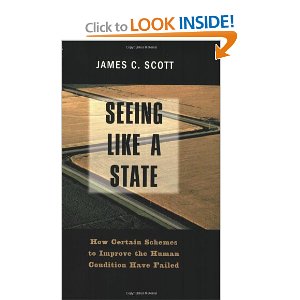
Professor James C. Scott (Author)
5.0 out of 5 stars Structural Dysfunctionalism
November 18, 2001
ByMichael Biggs (Oxford, United Kingdom) – See all my reviews
James Scott is known for portraying the moral world of peasants, showing how they have resisted the encroachment of capitalism and the state. Now he investigates the other side: the experts, bureaucrats, and revolutionaries whose grandiose schemes to improve the human condition have inflicted untold misery on the twentieth century. Seeing Like a State can be read, along with Foucault's Discipline and Punish and James Ferguson's The Anti-Politics Machine, as a classic of ‘structural dysfunctionalism.' The point (put metaphorically) is not merely that the cure for social ills has proven inadequate-but that the disease inhered in the diagnosis, and that failure will continue so long as the doctors prevail.
The dysfunction, Scott argues, derived from three modern conditions.
One was the ambition to remake society (and ecology) to conform to a rational plan. It is the conviction-expressed by such varied characters as Robert Owen, Le Corbusier, and Mao (pp. 117, 341)-that the present is a blank sheet, to be inscribed at will. Putting this into effect required a second condition: comprehensive information about individuals and property, gathered by a centralized bureaucracy. The third condition, what made the combination lethal, was a state sufficiently powerful to force its radically rational schemes on their ‘beneficiaries.' This was characteristic of post-revolutionary and post-colonial regimes, and so the book devotes chapters to collectivization in the Soviet Union and ujamaa ‘villagization' in Tanzania. But the basic vision, Scott emphasizes, was common to experts everywhere. Three Americans planned a Soviet sovkhoz in their Chicago hotel room; a democratic populist built Brasília, which is also accorded a chapter.
In probing the pathology of planning, Scott brilliantly exposes how experts conflated aesthetics with efficiency. They believed that social and ecological organization was rational only insofar as it conformed to their visual aesthetic (here called ‘high modernism'). This meant the repetition of identical units, preferably in the form of a geometrical grid. It also entailed spatial segregation: each activity or entity must be allocated its own place. Polycropping was thus anathema to agricultural scientists, as mixed-use was to urban planners. What experts envisaged, of course, was how the thing appeared-from above-on a map or in a model. Along with aesthetics went gigantism, as scale too was confused with efficiency. The space of the plan existed outside geographical locality and historical contingency-obstacles to be eradicated. An ideal city, for example, could be sited anywhere in the world; once built, it would never change. Planners created new spaces in order to create new people, the productive and contented automatons imagined by (say) Frederick Taylor or Lenin.
In analyzing their failure, Scott is most valuable for drawing parallels between society and ecology. Collectivized agriculture was doubly deficient, in its use of natural resources and of human beings. Forests as well as cities created on geometrical lines inevitably degenerated. In both realms, radical ‘simplifications' destroyed the adaptability and stability that had evolved organically. Scott introduces the Greek word ‘metis' (crafty intelligence) to describe the local, unwritten knowledge gained through practice or accumulated over generations. It was adequate to the diversity of natural environments, and was distributed throughout society. This kind of knowledge was disregarded or dismissed by experts. And yet, ironically, their plans would have been still more disastrous without the metis of people subjected to them. Collectivized peasants farmed private plots for the black market; workers in Brasília built shantytowns outside the city.
From an anarchist understanding, Scott has come close to Edmund Burke (never cited directly, though see p. 424). Two centuries ago, he witnessed the eruption of utopian schemes in France and their imposition on India, and realized that the combination of abstract reason and untrammeled power is infinitely destructive. “I cannot conceive how any man can … consider his country as nothing but carte blanche-upon which he may scribble whatever he pleases.” His defense of ‘prejudice' resembles Scott's appreciation of metis. The similarity is remarkable given their inimical ideals, aristocratic hierarchy versus democratic equality. If Scott does not fully appreciate his affinity with Burkean conservatism, he does not quite extricate himself from Hayekian liberalism (see p. 8). He succeeds in showing how the ideas behind collectivized agriculture came from plans for giant capitalist farms. Nevertheless, liberal economies are not so prone to pathological dysfunction, because firms are constrained by the need to attract free labor and to make profits. True, as Scott observes, the state often favors inefficient large enterprises (like plantations) because they are easily taxed; they also wield sufficient influence to obtain protection. The reader is left, however, wondering how he will resist being appropriated by opponents of (democratic) ‘big government.'
Other questions too remain. Scott asserts a continuity of aim between absolutism and totalitarianism; twentieth-century states simply fulfilled the dreams of their dynastic precursors. Do we really know that such vaunting ambition was common to rulers everywhere, or was it peculiar to Europe since the Renaissance? Scott's critique of pseudo-rational knowledge bears directly on our own disciplines. Many versions of social science proceed from the same assumptions that have been falsified in the ghastly experiments of our century. How can social scientists analyze the irreducible complexity of society, generalize without effacing the particularity of history and geography? In raising such difficult-and fruitful-questions, Seeing like a State is a book of immense importance. It must be read by anyone seeking to understand the modern world.




